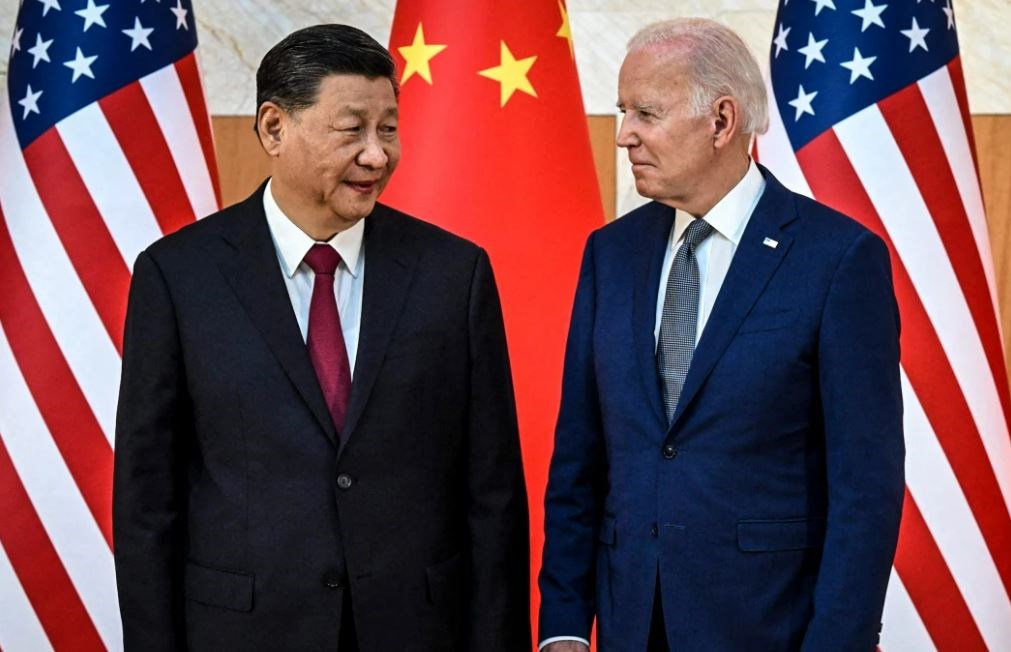Factcheck: 'China's military isn't going global'
The New York Times raises concerns about the alleged global expansion of Chinese military bases, but the actual situation is more intricate and less alarming.
-

Chinese President Xi Jinping and President Joe Biden meet on the sidelines of the G20 Summit in Indonesia on Nov. 14. 2022. (AFP)
The New York Times featured a guest essay written by Craig Singleton, a fellow at the Foundation for Defense of Democracies, titled "China's Military Expansion on the Global Stage." In this piece, Singleton asserts that Beijing is actively establishing a worldwide network of "strategic hubs situated along China's crucial trade, energy, and resource pathways." This network is perceived as a significant military challenge to the United States, as per Singleton.
By adopting a framework similar to China's Belt and Road Initiative, Beijing's purportedly new “under the radar” strategy is perceived as a direct challenge to Washington's capacity to execute vital international military operations, such as "safeguarding Taiwan."
In reaction to this growing danger, Singleton advocates for the United States to formulate a strategy aimed at proactively countering China's actions. This strategy may involve offering incentives or imposing penalties on host governments to thwart China's moves.
According to a report by Responsible Statecraft, there is undoubtedly a need to closely scrutinize China's military-related endeavors abroad, particularly in sensitive regions; however, this scrutiny should involve a meticulous analysis of concrete facts, distinguishing between proposed intentions and realized actions, as well as discerning between endeavors with commercial or military objectives and those related to non-military security. It's essential to assess the potential military advantages China could gain from specific locations or operations.
'Essay filled with distortions'
That’s the take offered by Michael D. Swaine, a Senior Research Fellow on East Asia at the Quincy Institute and one of the most prominent American scholars of Chinese security studies, who expressed surprise that the New York Times "saw fit to publish such an essay," as it is filled with "distortions, exaggerations, and speculations."
Swaine argued that Singleton takes a lax approach to the evidence rather than adhering to requirements, employing cautious terms like "might," "may," "could," "suggests," "suspected," and so on. In accordance with this, almost every imaginable current or potential Chinese overseas "presence" in commerce, science, or security is categorized as part of an intentional, coordinated, military-centric strategy aimed at reshaping the global military balance in Beijing's favor and, consequently, posing a threat to the United States.
In a piece published by Responsible Statecraft, Swaine acknowledged that China has, up to this point, established just one operational overseas military base in Djibouti, located in the Horn of Africa. There is also a possibility of China setting up a naval facility in Cambodia. However, there are significant limitations to China's capacity to replicate such bases extensively.
In Swaine's view, several of the security-related facilities that Singleton uses as supporting evidence for his claim have purposes beyond posing a military threat to the United States. These functions include anti-piracy operations, United Nations peacekeeping missions, non-combatant evacuation efforts during emergencies, or safeguarding nearby investments. The potential for these facilities to transition into more aggressive roles is thus expected to be significantly restricted.
The gist of Swaine's argument is that most countries that receive Chinese engagement prioritize commerce and investments above other considerations. In fact, a substantial number of the locations that Singleton suggests as new Chinese military bases or potential bases are primarily characterized by their commercial or civilian scientific presence, and some have only a vague potential for military utilization.
While a few existing commercial facilities, like those in the UAE, might develop limited military roles, the extent of this transformation remains uncertain. It can be argued that such commercial sites do hold a form of strategic significance, but it is primarily within the context of Beijing's ambitions to establish itself as a major player in commerce and science/technology, rather than a direct challenge to the global military supremacy of the United States, he further added.
Read next: US eyes new military base in Iraq's oil-rich region: Sources
Dangerous 'string of pearls'
Swaine adds, "In truth, Singleton’s argument is an updated and expanded version of the so-called “string of pearls” idea that appeared many years ago. Originating with an American corporation, the concept sought to link together some of China’s overseas activities in Southeast Asia and along the Indian Ocean to the Middle East to form a grand Chinese strategic move to dominate the region militarily and politically. As with the present version, the reality fell far short, usually for similar reasons."
If these measures were applied to the majority of the examples he presents as such activities, there is a significant risk that it could have unintended consequences. Target countries might perceive Washington's actions as an effort to undermine what they consider to be legitimate commercial and scientific dealings with China, he added.
"China’s expanding overseas commercial, scientific, and security presence requires close, careful examination, no question. Unfortunately, this essay does not offer such analysis. Indeed, by publishing it, the New York Times has more likely provoked an even greater level of threat inflation than already exists in Washington and elsewhere," Swaine concluded.
Read more: Why increase of US alliances in Asia does not mean an Asian NATO: Time

 5 Min Read
5 Min Read








